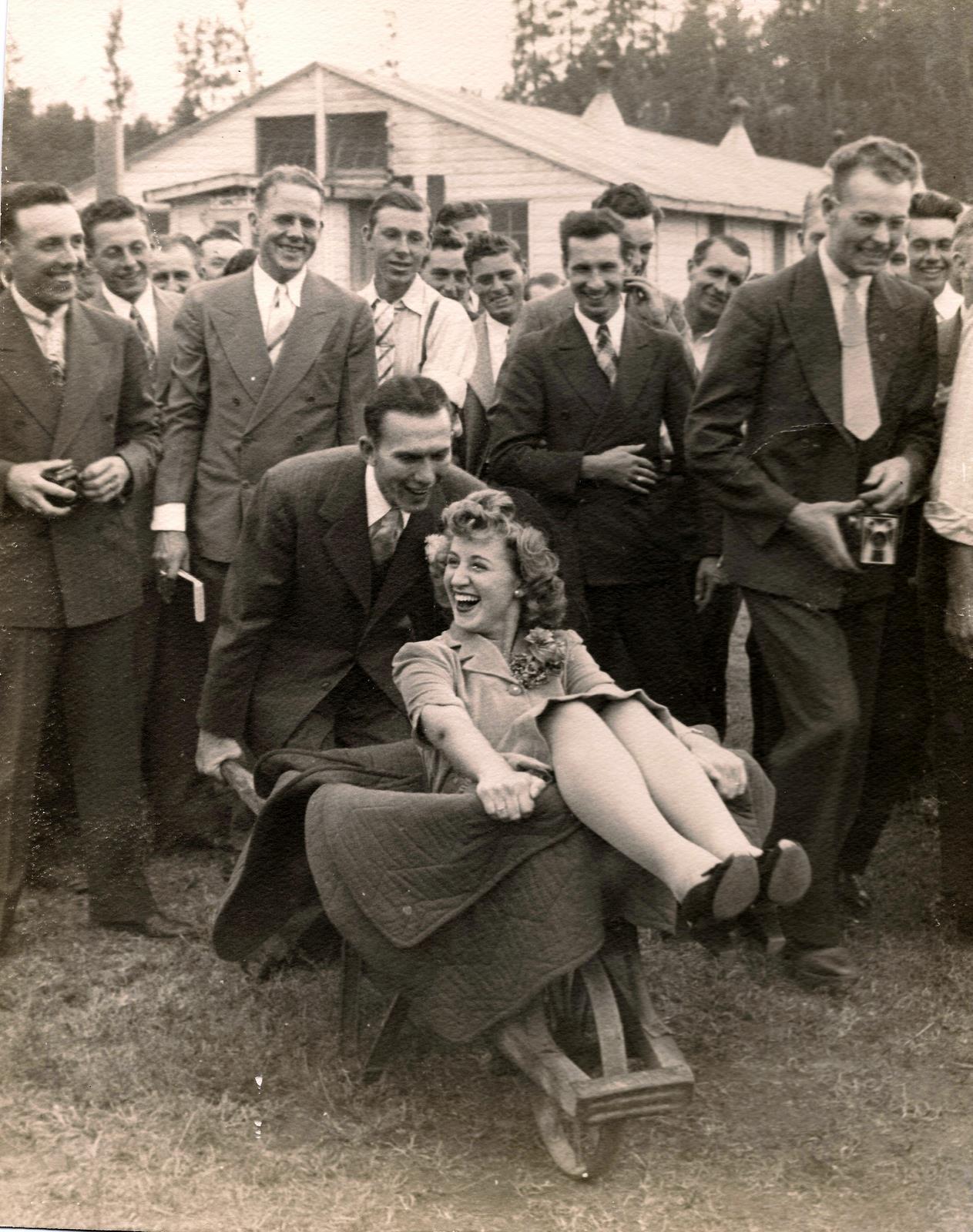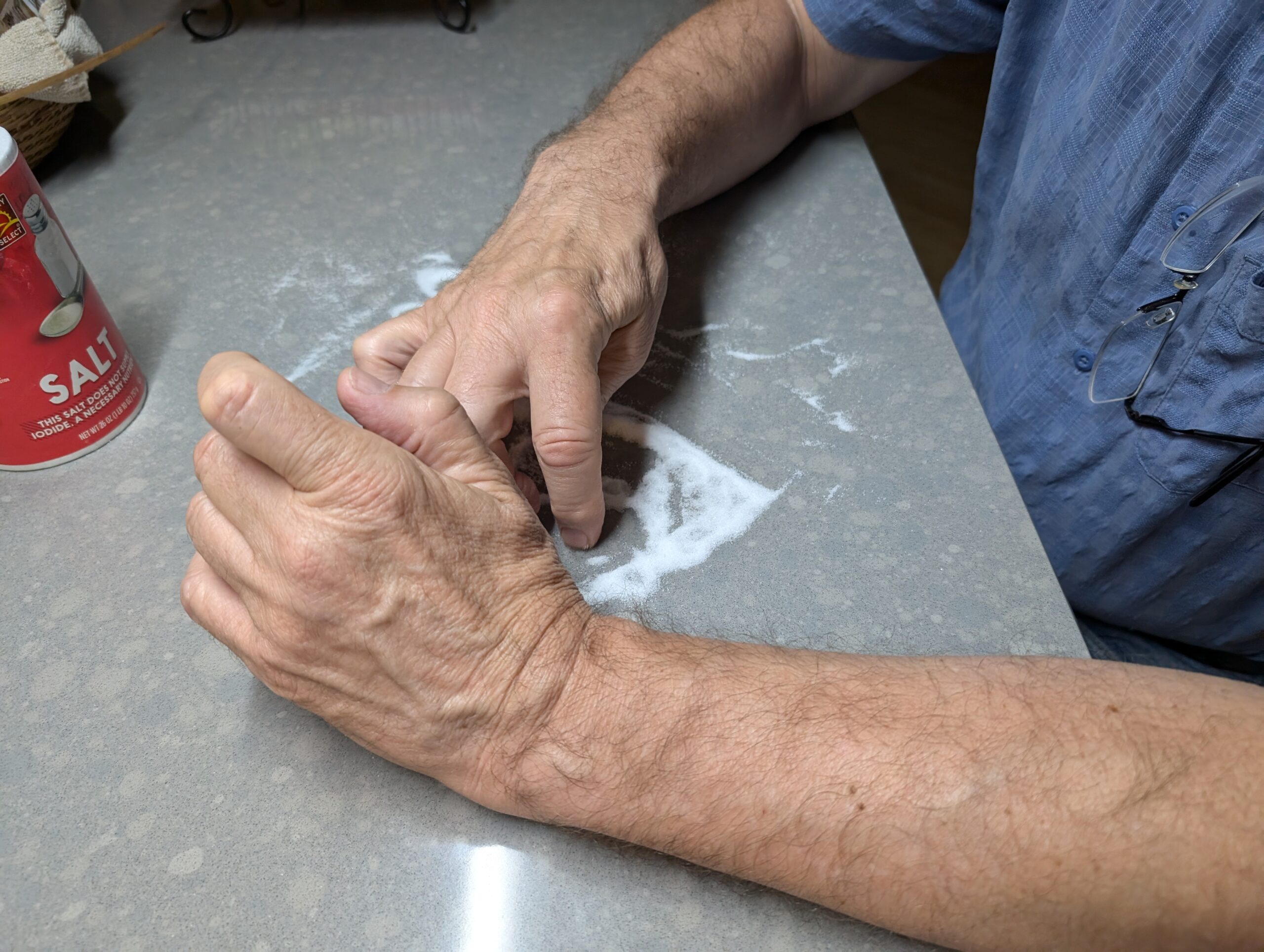50 Give or Take, May 9, 2025 A pastor and social activist for his lifetime,…

“Mennonite Women and World War II”
California Mennonite Historical Society Bulletin, no. 40, Spring 2004
(Cover photo credit: Christine (Janzen) Moyer)
Cover photo caption: Pearl and Victor Janzen’s 1943 wedding took place in the Hill City (SD) Civilian Public Service Camp. Their “wedding trip” consisted of a wheelbarrow ride around the camp.
Mennonite women and World War II: braving others’ objections to follow their consciences.
In his article, “Sewing Peace,” Brian Froese writes about the Mennonite women of California who became engaged in World War II through the work of the sewing circles in their local churches. Another group of women, smaller in numbers, became involved outside their home communities. During the war, more than 2,000 women, members of the Historic Peace Churches from across
the United States, became part of Civilian Public Service (CPS) as conscientious objectors to war. According to Mennonite historian, Rachel Waltner Goosen, conscription only involved men, but Civilian Public Service was not exclusively male.1 Many women went to be with their husbands who had been conscripted; a few women went alone, citing personal convictions. Some worked in the camps while others found employment in nearby towns.
The women who were part of CPS have many stories to tell regarding life during WWII. The war left indelible and lifelong impressions on these women’s lives when they moved around the country and encountered new situations. Like the men of CPS, the women walked against the mainstream of society and their communities, and at times, even against that of their churches or families. In vivid detail, they recall the misunderstanding and ridicule that they faced on occasion. Even though it was not an easy time in their lives, the women believed (then and now) that they were doing the right thing as they followed the dictates of their consciences.
Following are several stories of Reedley women who lived in or near camps during WWII. One woman worked in both a CPS camp and a Japanese relocation camp. These were lifealtering experiences as the women traveled to new places, met new people, and explored a world of new ideas. These accounts are based on oral interviews.2
Florence Auernheimer Gomez
(1907-2003) • First Mennonite Church, Reedley, California (Based on an interview with Florence’s sister, Selma Auernheimer, July 2003)
At the beginning of World War II, Florence Auernheimer was a kindergarten teacher in Reedley, California. With the entry of the United States into the war, the district superintendent of schools called on teachers to encourage their students to sell war bonds. Florence refused to participate in this endeavor, citing her conviction as a conscientious objector to war. Furthermore, she believed that the children in her kindergarten class were too young to understand the meaning of war bonds and therefore could not be asked to sell them.
For her repudiation of his request, the superintendent fired Florence. Despite her love of teaching, Florence knew that it would not be easy to get a job of her first choice, particularly with the dismissal on her record so she looked elsewhere. When she
heard that the Camino (California) Civilian Public Service camp needed a dietitian, Florence chose to go there. After part of a year as the Camino dietitian and cook, the state superintendent of schools called on Florence, asking her to consider teaching school at the Tule Lake Project, a Japanese relocation camp near Newell, California. It was not easy to find teachers who were willing to work in the camps but Florence was ready. She taught at Tule Lake for the remainder of the war.
In September 1943, when Florence arrived at Tule Lake she saw immediately that the living conditions were unhealthy. In particular, some of the structures were incomplete, making it impossible to heat the living quarters adequately. Throughout
her first winter at Tule Lake Florence witnessed much illness. When one young girl died of pneumonia, Florence determined
once again to take action. Cognizant of her own power as a teacher where few people wanted to teach, Florence threatened to quit if the government did not finish the rooms and provide sufficient heating. It was not long before they complied. This change could not alter the indignities and the pain of forced internment, but Florence had done her part to make life a bit more bearable for the Japanese-Americans who spent time there.
Pearl Miereau Janzen
First Mennonite Church, Reedley, California
(Based on an interview with Pearl Janzen, November 2002)
When Pearl Miereau was a teenager during the depression in her hometown of Henderson, Nebraska, she innocently suggested that her brother, a tuba player, join the army marching band to earn some money. Her parents’ reaction was immediate and unambiguous. Becoming part of the military—even if only the band—was not an option.
A few years later, the discussion of joining the military became a personal issue when Pearl and her fiancé, Victor Janzen, faced his conscription during World War II. As they pondered the implications of the choice between military or alternative service, Pearl and Vic, with the support of their parents, understood that the young couple would follow a path that would not be easy. They would perform alternative service administered by their church.
Despite their parents’ encouragement, when Pearl and Vic talked about this decision with other members of their church or with friends from the community the discussions took some difficult turns. An uncle told them that he could kill for his country and implied that they too should be willing. A rift developed when Pearl’s best friend married a soldier. Others in church joined the military even though their church advocated alternative service. Community reactions were strong and negative toward conscientious objectors.
When Vic was drafted, his local draft board denied him his right to register as a conscientious objector, a decision that was overturned on appeal. Shortly after he left for alternative service, Pearl joined him and they were married at the Hill City (South Dakota) CPS camp where he worked. Pearl lived and worked in nearby towns throughout most of the first years of their marriage. The only exception was during their time at the Downey (Idaho) CPS camp. There Pearl worked as a dietitian and lived in the camp along with their oldest daughter Carolyn.
When Pearl ponders her life as a conscientious objector during WWII, she remembers the clarity of her conviction but also the pain that accompanied it. “People often asked us why we did not support the war and why Vic wasn’t in the army,” she says, “and they seldom liked our answer.” Animosity was visible in their community where people were grieving the loss of family members in the military. “Even the movies and popular songs praised the soldiers,” Pearl continues, “and all of that added up to a lot of pressure.” Despite opposition from community and societal glorification of war, Pearl and Vic remained united in their beliefs.
It was a rewarding time, if a difficult one, a period of their lives that Pearl now believes stretched them, deepening their convictions and setting the tenor of their faith and lives. They built new friendships and learned to know people from across the country. “I wouldn’t trade that time for anything,” Pearl says. “I grew up there.”
Lu Kliewer Klassen
Reedley Mennonite Brethren Church
(Based on an interview with Lu Klassen, February 2003)
As with so many women, World War II fostered significant changes in Lu Kliewer’s life. This young woman from Reedley who had never ventured beyond Fresno and Tulare Counties recalls, “I was even afraid at the thought of going to Sacramento.” When the need arose, however, Lu overcame her fears to travel by train across the United States to meet her husband, Herk Klassen, in Maryland. After a few years in Maryland, they moved to a CPS placement in Wisconsin for the duration of the war.
Initially, Herk’s assignment was to the Camino (California) Civilian Public Service camp east of Sacramento. It was while he was there that Herk and Lu decided to get married. After a flurry of preparations, the wedding took place during one of his all-too-brief leaves of absence. It was only a few days before the scheduled wedding, however, when they found out whether he would
be allowed to leave camp to return to Reedley for it.
Shortly after their wedding, Herk transferred to the Clear Spring (Maryland) CPS camp where he worked at the Farm and Community School. Soon Lu decided to take the train across the country to be near him. “At this time in my life,” Lu states, “I
had never been out of California. I found out at choir practice that Mr. Eitzen, a missionary to the Belgian Congo, was leaving
Reedley to go to Pennsylvania so I asked him if he would mind having a travel companion.” He agreed and Lu rode the train with
him to Chicago where Herk met her. For the duration of the war, Lu, like many other wives of conscientious objectors, lived and
worked near the CPS camp where her husband was stationed.
Lu remembers this as a time when she met new people. “The East Coast Mennonites were not like the Mennonites I knew at home but we became good friends.” Even greater were the differences between Lu and her employers. “Mrs. Grice was kind to me,” Lu says, “but her daughter lived with her and she was different. She objected to my Mennonite friends. ” Among other things, Lu had to defend her reason for refusing to work on Sunday.
Occasionally, they encountered ridicule for being conscientious objectors, but Lu and Herk continued to believe that they needed to take this stand. “I certainly couldn’t see Herk going out and killing anyone,” Lu says. Lu worked at a variety of jobs over the next several years. She was a live-in housekeeper, a telephone switchboard operator and finally, with the birth of their first child, she stayed at home to care for their daughter, along with the infant daughter of another CPS family.
When Lu talks about the formation of life-long friendships during her first time away from California, she echoes a common theme among women who were associated with Civilian Public Service. Lu kept in touch with many of these newfound friends throughout her lifetime.
Within these few years, Lu went from a young woman who trembled at the thought of change to one who traveled far, courageously meeting new people and experiencing unfamiliar ways of thinking. The time she spent in CPS solidified her beliefs. “It was a million dollar experience,” she said, “but I wouldn’t give a nickel for another one like it.”
(Footnotes)
1 – See Rachel Waltner Goosen’s book, Women Against the Good War: Conscientious Objection and Gender on the American Home Front, 1921-1947, Chapel Hill: University of North Carolina Press, 1997.
2 – According to Goosen, men’s war memoirs have defi ned the experience of WWII. For women and for pacifi sts there are few such memoirs. Historians have come to rely on oral histories, with all the accompanying limitations, for information on women’s experiences of WWII.
https://fpuscholarworks.fresno.edu/items/ce149f74-7020-489f-a2df-4932e0703a43



